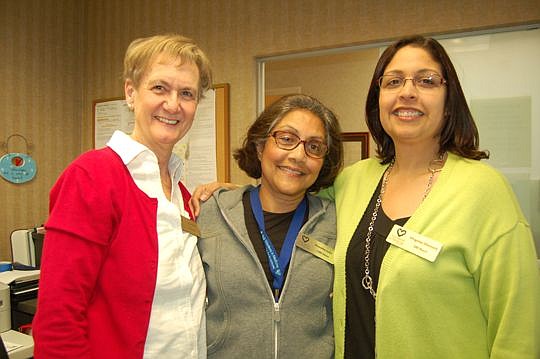
With more than 20 million people enrolled under the Affordable Care Act, the government program intended to ensure access to health insurance coverage, you might think business would be slow at Volunteers in Medicine.
Actually, it’s not.
The Downtown clinic opened in 2003 at 41 W. Duval St. to provide primary services to a segment of the population that was falling through the cracks in health care: working people who didn’t qualify for government-provided care, but also didn’t make enough money to be able to afford health insurance.
While 600 patients were treated in the first year, that number has steadily grown to more than 2,000 patients.
More than 55,000 patient appointments have been provided since and the appointment book is as full as it ever has been, said Mary Pat Corrigan, Volunteers in Medicine CEO.
The Affordable Care Act has had some effect on the number of patients at the clinic, but there remains a great need in the community, with at least 75,000 working adults in Duval County who do not have health insurance.
“Some of our patients have gotten insurance, but others have discovered they can’t afford it,” Corrigan said.
A single person who works and earns $13,000-$29,000 can qualify to be treated at the clinic. For a family of four, the maximum household earned income to qualify is $42,000.
The clinic has an annual budget of about $750,000 and six paid staff members. But most of the services from the time a patient walks in the door until they leave after a stop at the in-house pharmacy are provided by more than 200 volunteers, including physicians, nurse practitioners and support staff.
Financial support comes from individual and corporate donors. The area’s major health care institutions treat patients who need more than primary care for free.
Baptist Health, St. Vincent’s HealthCare and Mayo Clinic are major supporters, Corrigan said. Grants cover the cost of medications needed by patients.
Medical care is available from psychiatry to podiatry as well as laboratory services and diabetes, nutrition and weight management education. Dental care, eyeglasses and mental health counseling are available.
“We’re trying to keep people working and trying to keep them out of the emergency room,” said Corrigan. “We are one of the better models of integrated health care in this area.”
Part of Corrigan’s job is to educate the community about the need for a clinic like Volunteers in Medicine. She said if you ask people you meet every day whether they have health insurance, don’t be surprised if about one out of five tells you they do not.
“Our patients are everybody that serves you. They’re day-care workers, school-bus drivers, restaurant, fast-food and cafeteria workers, security officers, people who work in nail salons and lawn-care workers and housekeepers,” she said.
In summing up the concept behind Volunteers in Medicine, Corrigan quoted Dr. Ken Adams, a cardiologist and long-time volunteer at the clinic.
“A lot of people talk a lot about health care and coverage — we just do something about it.”
@DRMaxDowntown
9904) 356-2466